All-time best T20 World Cup XI
In almost every edition, the world has witnessed new champions who have led their sides to titular heists.
2 Min Read
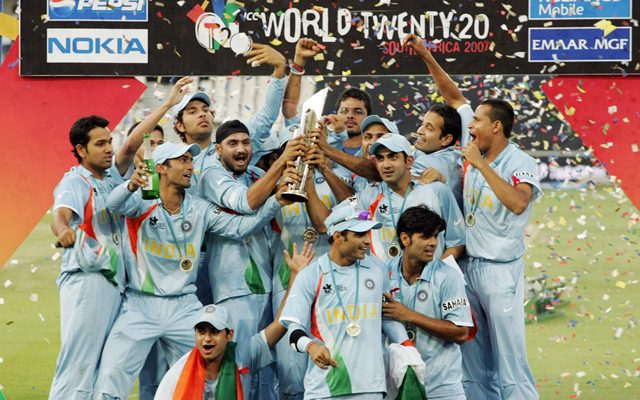

World Twenty20 in South Africa, 2007. (Photo by Duif du Toit/Gallo Images/Getty Images)
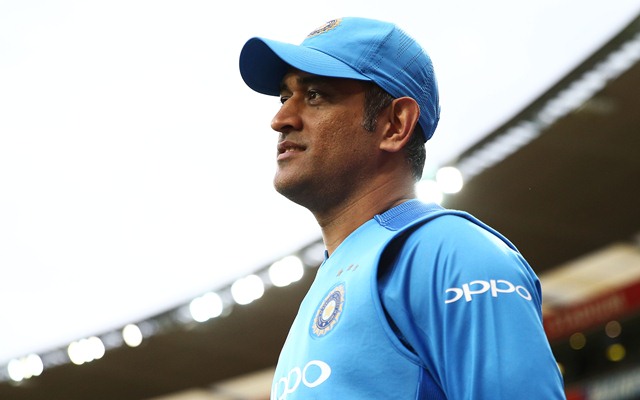
We have had six T20 World Cups thus far, and during the course of all those six editions, we have had plenty of memorable moments that have proceeded to impinge themselves on the cricketing folklore for a lifetime. We have edge-of-the-seat thrillers, we have seen six sixes, we have seen hat-tricks, we have seen gobsmacking upsets, we have seen a come-from-behind heist, and amidst all this, we have also seen a plethora of heartbreaking moments.
In almost every edition, the world has witnessed new champions who have led their sides to titular heists. The next edition of the T20 World Cup is just a few months away. The quadrennial event will be held in October in Australia, and so what better time than now, to walk down memory lane and form a best-ever World XI in T20 World Cup history.
The list below is not only picked on the basis of numbers but it is also based on the impact that a few players- who may not have the stats to show for themselves- may have had in the past six editions.
Here’s an all-time best T20 World Cup XI:
1. Chris Gayle
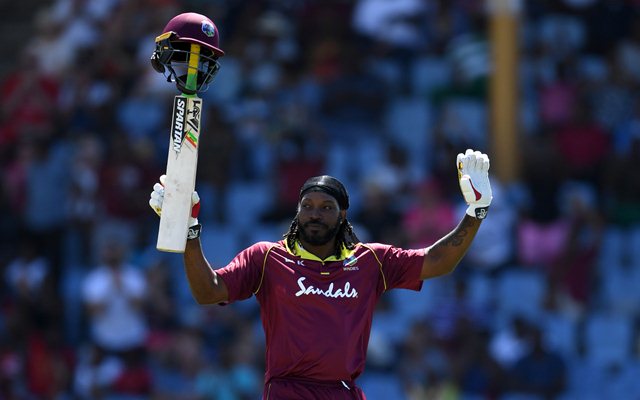
No T20 XI- whether it is of the IPL or pf the T20 World Cups- can ever be completed without the ‘Universe Boss’. The two-time World Cup winner, Gayle was the first-ever centurion of the ICC T20 World Cups. The southpaw set the tournament alight in its very first game when he shellacked the South African bowlers to all corners to Johannesburg.
Since then, Gayle has had an impact on almost every succeeding tournament. Who can forget the six that he hit off Brett Lee the Oval in the 2009 edition or his shellacking of the Indian attack in 2010 on home soil or his whirlwind hundred against England in the last edition? The ‘Universe Boss’ has always saved his best for the quadrennial event, and the stats back it too. The big Jamaican is the second-highest run-scorer in the history of the competition and is the only batsman to score two centuries.
In 28 games, Gayle has racked up 920 runs at an average of 40 and a whirlwind strike-rate of 146.73 with seven half-centuries and two three-figure scores.
2. Shane Watson
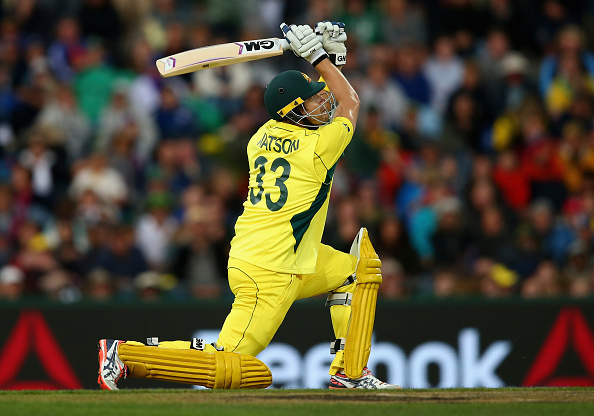
He could bat. He could bowl, and he could certainly field. Shane Watson is pretty much the torchbearer of Australian T20 cricket in the first 5-6 years of its inception. The mercurial all-rounder, who still remains one the most sought after T20 players in almost every franchise tournament around the world, four years after his retirement, was one of the key performers for the Aussies at the T20 World Cups.
The right-handed all-rounder proceeded to form a swashbuckling opening partnership with David Warner and scripted many victories for his country. Watson was at the peak of his powers during the 2012 edition in Sri Lanka where he not only finished as the leading run-scorer- 249 runs in six games at 49.80- but also as the leading wicket-taker- 11 wickets at 16.0- for Australia.
Overall, in 24 T20 World Cup fixtures that Watson played, the all-rounder racked up 537 runs at a strike-rate of 140.94 and 22 wickets at an average of 27.63.
3. Virat Kohli
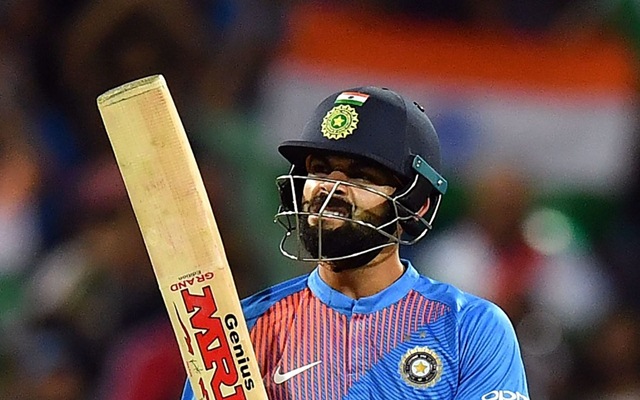
If there ever is a ‘Hall of Fame’ of the best ever T20 World Cup XI, Virat Kohli’s name will be among the first to be included. It is disappointing that Kohli doesn’t yet have a T20 World Cup medal, because no one has contributed to a team’s cause in this quadrennial event more than the current Indian captain.
Kohli is the recipient of the ‘Player of the tournament’ of the past two T20 World Cup editions where he almost single-handedly took Team India on the cusp of the crowning moment before his more-celebrated team-mates let him down in the closing moment.
Kohli gets a lot of criticism about his lack of performances in the knockout fixtures of the 50-over World events, and rightfully so! But, what some people forget that the same is not the case with his performances in the knockouts of the T20 World Cup. If his 72 against Dale Steyn and co in the 2014 semi-finals was a masterclass in strokeplay and talent, his unbeaten 81 against Australia in a virtual quarterfinal in Mohali in the 2016 edition what was the epitome of skills and temperament-par excellence.
Overall, the Indian captain has racked up 777 runs in just 16 T20 World Cup games and is the fourth leading run-scorer in the history of the competition at an average of 86.33 and a strike-rate of 133.04 with nine half-centuries- three of which have come in the semi-finals/finals of the 2014 and 2016 event respectively.
4. Marlon Samuels
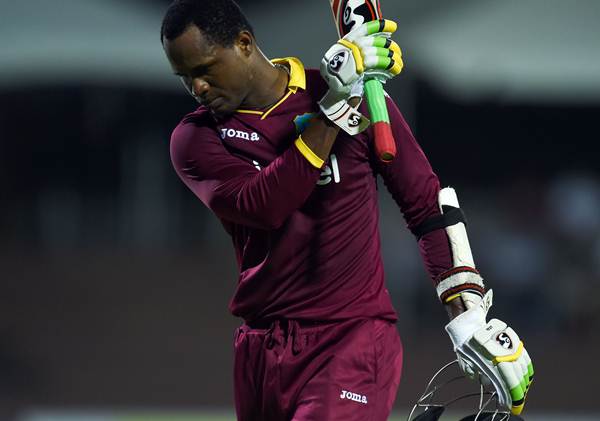
“Carlos Braithwaite….Carlos Brathwaite!!! Remember the name!!!” Ian Bishop’s and the all-rounder’s heists in the T20 World Cup final made Carlos Brathwaite an overnight sensation, and deservedly so! Braithwaite had indeed achieved something very very special.
But, would that have been possible, had Marlos Samuels not anchored the fledgeling West Indian innings during the run-chase. Amidst all the euphoria of Carlos Brathwaite’s four sixes, fans tend to forget the bedrock for that final assault was Marlon Samuels’s unbeaten 66-ball 85.
Samuels T20 World Cup numbers- 531 runs in 20 games at an average of 31.17 and a strike-rate of 115.72- may not be particularly impressive, but the right-hander played two of the most important innings in the tournament history; one that propelled his side to two titles- 2012 and 2016.
Samuel’s best knock came in the final of the 2012 T20 World Cup against Sri Lanka where the right-hander anchored and then propelled his sides’ fledgeling innings. Samuels stroked a brutal 56-ball 78 where he just teed into Lasith Malinga [0-54] at the death, and eventually proved to be the difference between the two sides.
5. Yuvraj Singh
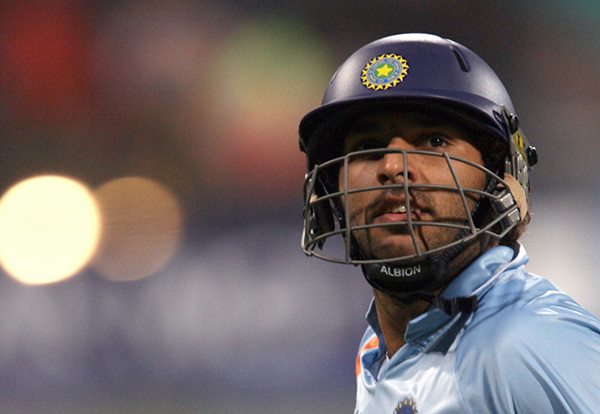
No discussion about anything close to the history of the T20 World Cup can ever be complete without the mention of Yuvraj Singh. The southpaw may have had his fair share of low points, like for example his forgettable 21-ball 11 in the final of the 2014 edition, but no one can ever deny or forget the impact his performances had on not only the revolution of the event but also of the T20 format in general.
Who can ever forget the six sixes that he stroked off the bowling of Stuart Broad at Kingsmead that set the inaugural edition alive or his swashbuckling 70 off 30 balls after India had been reduced to 2-47 after nine overs in the all-important semi-finals against the world-beating Australians where he nonchalantly flicked the likes of Brett Lee for fun.
He was also the leading run-scorer for India in an otherwise forgettable campaign of 2009 where he racked up 153 runs at an average of 38.25 and a strike-rate of 154.54. Yuvraj’s final appearance came in the last edition in India where he played a crucial knock against Pakistan at the Eden Gardens before he was sidelined due to injury. Overall, the southpaw is the tenth leading run-scorer in T20 World history- 593 runs in 31 games with four half-centuries.
6. MS Dhoni (wk)
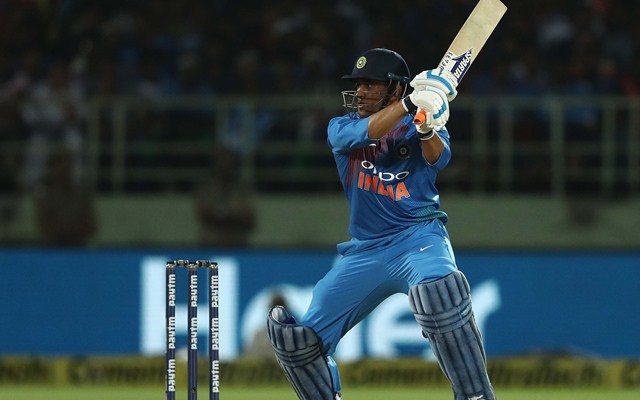
T20 World Cups and MS Dhoni, tell me a story that has seen more ups and downs in history. When you say MS Dhoni and T20 World Cup in a single sentence, only two images would instantly come to your mind. The first one will be of a young, long-haired individual rejoicing with his young side in World Cup glory in the inaugural edition while the second image will be of an athlete sprinting to the wicket to run out the batsman at the closing stages of India vs Bangladesh 2016 T20 World Cup encounter.
Dhoni’s best knocks with the bat came during the 2007 World Cup where he scored a crucial 33-ball 45 against the South Africans and then in the semi-finals against Australia where he racked up a whirlwind 18-ball 36. His partnership with Virat Kohli in the virtual quarter-final of the 2016 event in Mohali, where he may just score 18 was pretty crucial considering the way he complimented Virat in running between the wickets.
Overall in 33 games, Dhoni scored 529 runs at an average of 35.26 and a strike-rate of 123.88. Whether he’ll get a chance to better these numbers? We’ll just have to wait and see.
7. Darren Sammy [C]
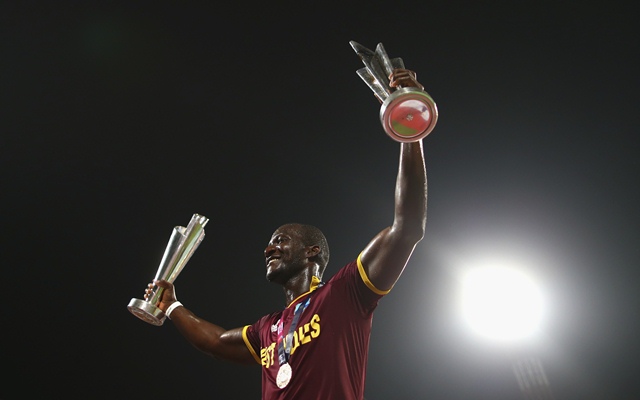
When we frame the best XI outfit, we tend to make a mistake of slotting the players merely on the basis of raw numbers. We often do not take into account the impact that the impact a particular player may have had whether it is with the bat or the ball or as a leader. Darren Sammy- the two-time World Cup-winning captain certainly comes in that list of impactful players.
And, it is not just because of the fact that Sammy is a two-time World Cup-winning captain or because of his impact with the bat or ball that he makes it into this list. It is because of the role that he played as a leader in transforming a set of match-winners into a world-beating unit.
Captaining a team like West Indies isn’t easy, and it certainly wasn’t during the 2016 event when a plethora of senior players including Sammy, were at loggerheads with their cricket board, but the manner in which the all-rounder marshalled his troops can certainly be earmarked as case-study for future leaders.
8. Shahid Afridi
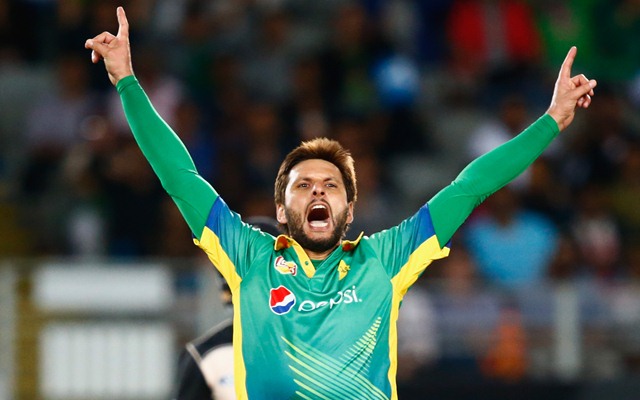
The mercurial all-rounder, who has played in all of the six T20 World Cups held thus far was one of the cornerstones in Pakistan doing so well in the first editions of the marquee event.
Afridi but adjudged the ‘Player of the Tournament’ in the inaugural World Cup in 2007 but it was really the 2009 edition where he was truly at the height of his powers; a tournament which Pakistan eventually won. The all-rounder, not only claimed 11 wickets in seven games at an average of 13.54 including the best figures of 4-11, but he also racked up 176 runs at a strike-rate of 140.80 which also included match-winning, matured knock of 54* in the finals against Sri Lanka.
Overall, Afridi is the leading wicket-taker- 39 wickets in 34 games at an average of 23.25- in the history of the T20 World Cups.
9. Sunil Narine
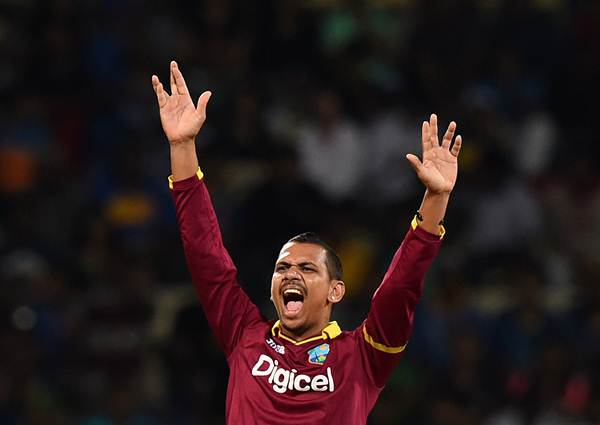
It was a difficult choice to leave out someone like Saeed Ajmal, given the record that he has in the tournament’s history- 3rd highest wicket-taker in the competition- but given the fact that we already have the leg-spin of Shahid Afridi- I opted to pick the off-spin of Sunil Narine.
Narine, in the shortest format of the game, is a force to be reckoned with. Not only can he bowl you the tough overs with giving almost anything away, but he can also serve the role of a pinch-hitter. Narine’s best performance in the T20 World Cup came when it really mattered: during the 2012 final against Sri Lanka where he claimed 3-9 to break the backbone of the home sides’ batting unit.
Overall, Narine has played 12 T20 World Cup games where he has taken 15 wickets at an average of 17.93 and a miserly economy rate of 5.17.
10. Lasith Malinga
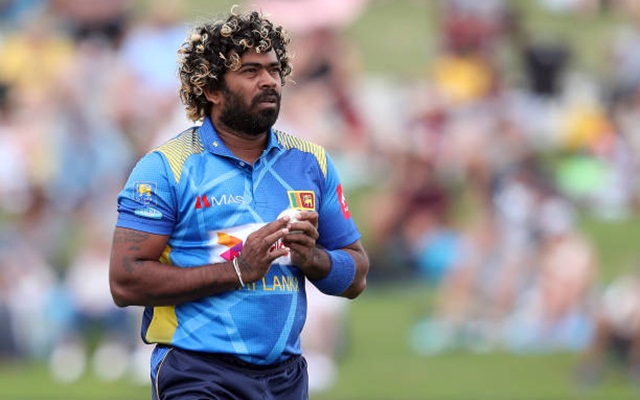
Lasith Malinga was hammered in front of his own fans in the final of the 2012 edition by Marlon Samuels. He couldn’t nail his yorkers and Samuels just laid into his low full-tosses.
Two years later, Malinga returned with redemption at the expense of the Indian batting unit and jammed in yorkers one after the other to put a choke on the likes of Yuvraj, Raina, Dhoni and even Virat Kohli. The champion bowler, not only redeemed himself but also led the Sri Lankans to the elusive world title.
Overall, Malinga was the spearhead of the Sri Lankan bowling unit in almost every T20 World Cup edition. He is the second-highest wicket-taker in the tournament’s history- 38 wickets in 31 games at an average of 20.07 – and will have a chance to leapfrog Shahid Afridi in the upcoming edition in Australia.
11. Umar Gul
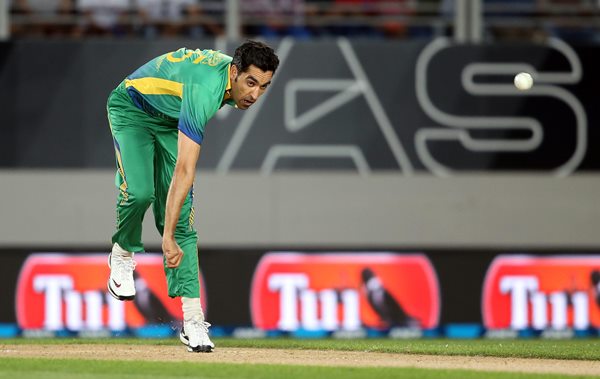
Umar Gul and his inswinging yorkers bowled at a ferocious pace were one of the prime reasons that Pakistan did so well in the first few editions of the T20 World Cup- especially in 2007 and 2009. The talented fast bowler was at his best during the 2009 edition where he emerged as the leading wicket-taker of the tournament with 13 wickets in seven games at an average of 12.15.
His best performance came against the Kiwis during the same edition where he bamboozled the BlackCaps with inswinging yorkers for fun, claiming barely believable figures of 5-6. Gul was also one of the bedrocks of Pakistan making it to the final of the inaugural event where he claimed the all-important wickets of Yuvraj Singh and MS Dhoni.
Overall, the right-hander is fifth on the list most wickets- 35 wickets in 24 games at an average of 17.25- taken by a bowler in the history of the competition.
Honourable Mention: Tillakaratne Dilshan
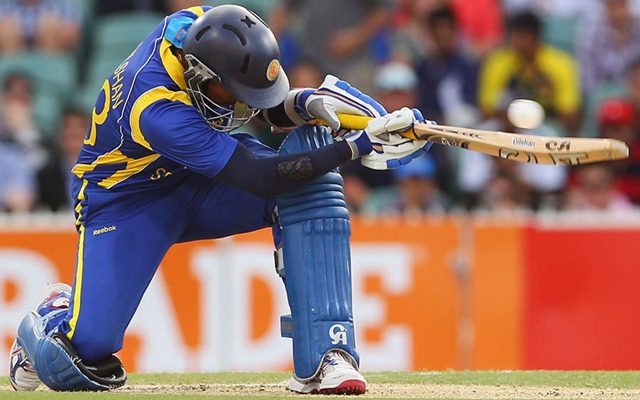
One of those rare bread of batsmen who ended up having a shot named after their name, Tillakaratne Dilshan was at the heart of Sri Lanka’s consistent performances at the T20 World Cup between 2009-14.
The middle-order batsman turned opener was certainly at the height of his powers in the 2009 edition of the T20 World Cup where he unleashed what is now famously called the ‘Dilscoop’- where he would go down on one knee and scoop the ball over the wicket-keepers’ head.
Dilshan was a mean run-churning juggernaut throughout the 2009 T20 World Cup where he finished as the leading run-scorer with 317 runs at an average of 52.83 and a strike-rate of 144.74. It was a pity that the right-hander missed out in the finals, and had to contend with the runners-up medal, something that he went to rectify seven years later in 2014. Overall, Dilshan scored 897 runs in 35 games at an average of 30.93 and a strike-rate of 124.06 with six half-centuries.
Download Our App